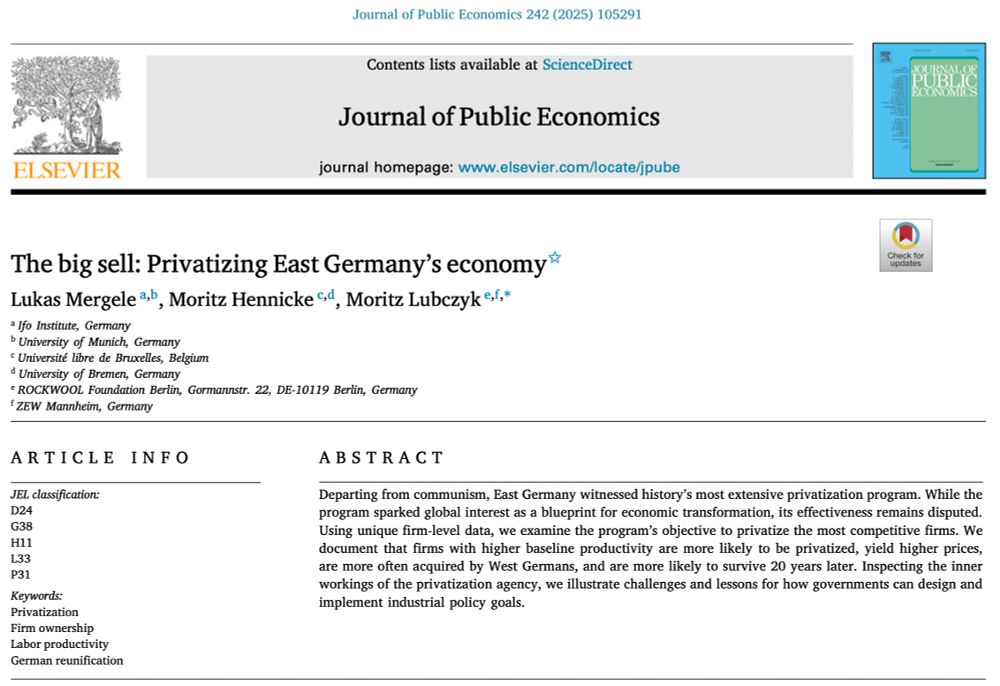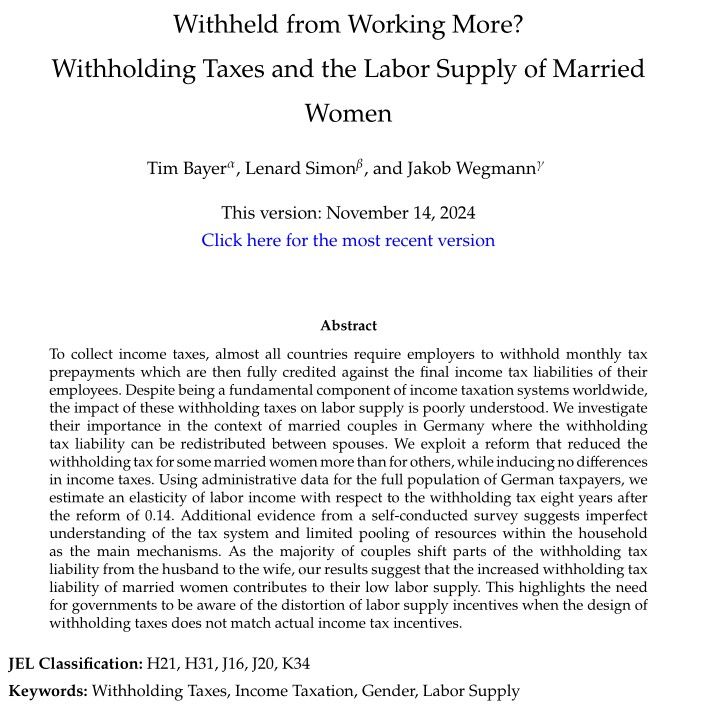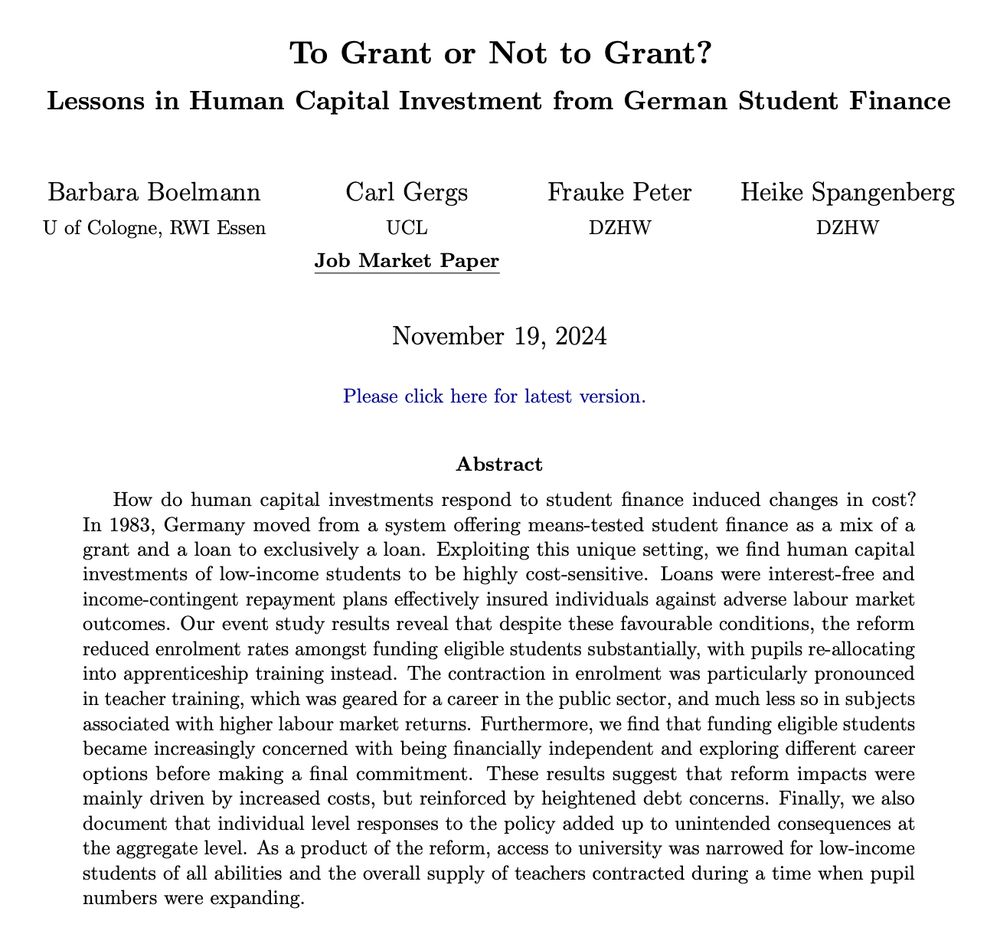https://carlgergs.com

www.tagesschau.de/multimedia/s...

www.tagesschau.de/multimedia/s...
Ulrich Glogowsky, Emanuel Hansen, Dominik Sachs, Holger Lüthen
cepr.org/voxeu/column...
#EconSky

Ulrich Glogowsky, Emanuel Hansen, Dominik Sachs, Holger Lüthen
cepr.org/voxeu/column...
#EconSky
Details: sophiepiton.com/papers/2025_...
Details: sophiepiton.com/papers/2025_...
ZHCs are back in the news again. Some thoughts:
1. I wish people would stop calling this a ban. The policy is going to give a right to a regular hour contract, most likely determined by hours worked over a 12 week reference period. A lot of details are.. 1/n

ZHCs are back in the news again. Some thoughts:
1. I wish people would stop calling this a ban. The policy is going to give a right to a regular hour contract, most likely determined by hours worked over a 12 week reference period. A lot of details are.. 1/n

2nd Labour Workshop in Nottingham
🎵Amazing Keynotes: @schoefer.bsky.social and Alexandra Roulet
🗺️Where: @uniofnottingham.bsky.social
📆When: 16-17 June
Submit by March 15 ➡️shorturl.at/TZqG0

2nd Labour Workshop in Nottingham
🎵Amazing Keynotes: @schoefer.bsky.social and Alexandra Roulet
🗺️Where: @uniofnottingham.bsky.social
📆When: 16-17 June
Submit by March 15 ➡️shorturl.at/TZqG0
@lukasmergele.bsky.social @aaoritz.bsky.social and I compile new data to study the “Treuhandanstalt” and it’s management of the privatisation process after German reunification
"The Big Sell: Privatizing East Germany's Economy"
By @lukasmergele.bsky.social, Moritz Hennecke, & @mlubczyk.bsky.social

@lukasmergele.bsky.social @aaoritz.bsky.social and I compile new data to study the “Treuhandanstalt” and it’s management of the privatisation process after German reunification
Ever wondered how financial aid - grants vs. loans - impacts students' college major choices? In a revised version of our paper, @adridefax.bsky.social and I provide answers using rich administrative data from Chile (link: papers.ssrn.com/sol3/papers....).
Here is a summary:

Ever wondered how financial aid - grants vs. loans - impacts students' college major choices? In a revised version of our paper, @adridefax.bsky.social and I provide answers using rich administrative data from Chile (link: papers.ssrn.com/sol3/papers....).
Here is a summary:
We’re thrilled to host David Autor at IAB as he presents: “Does automation replace experts or augment expertise? The answer is yes.”
🕑 January 15, 2025, 2:00 PM - 3:30 PM CET
🔗 Register here for onsite or online participation: eveeno.com/iab-speciall...

We’re thrilled to host David Autor at IAB as he presents: “Does automation replace experts or augment expertise? The answer is yes.”
🕑 January 15, 2025, 2:00 PM - 3:30 PM CET
🔗 Register here for onsite or online participation: eveeno.com/iab-speciall...
📢Excited to share my #JMP 📢
It provides a missing piece to understand how people react to income taxation.
Tldr: By changing tax pre-payments governments can - with almost no costs - increase perceived work incentives of secondary earners and reduce the gender gap.
Thread below👇🧵

🎓Move to full loan policy: ⬇️ enrolment rates of eligible pupils
⚙️Effect driven by ⬆️ costs but also heightened concerns with debt 💰
⚠️Overall: ⬇️teacher supply + narrowed access to university
#econjobmarket
❓What are the impacts of offering student finance as a grant or a loan?
In the paper, I...
🎓 Study individual university enrolment, subject choice & career motivations
❗️Explore aggregate outcomes e.g. access to university & the occupational structure
🧵👇

🎓Move to full loan policy: ⬇️ enrolment rates of eligible pupils
⚙️Effect driven by ⬆️ costs but also heightened concerns with debt 💰
⚠️Overall: ⬇️teacher supply + narrowed access to university
#econjobmarket
❓What are the impacts of offering student finance as a grant or a loan?
In the paper, I...
🎓 Study individual university enrolment, subject choice & career motivations
❗️Explore aggregate outcomes e.g. access to university & the occupational structure
🧵👇

❓What are the impacts of offering student finance as a grant or a loan?
In the paper, I...
🎓 Study individual university enrolment, subject choice & career motivations
❗️Explore aggregate outcomes e.g. access to university & the occupational structure
🧵👇

